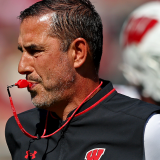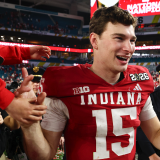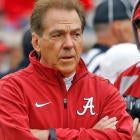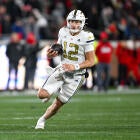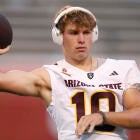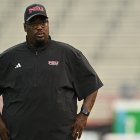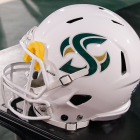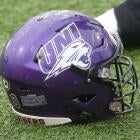Nick Saban retires: Seven-time national championship-winning coach, 72, exits Alabama after 17 seasons
Saban is widely considered to be the greatest college football coach of all time

Alabama coach Nick Saban, 72, has decided to retire, ending a run that ranks among the greatest in college football history. The seven-time national championship-winning coach leaves the game having spent his last 17 seasons with the Crimson Tide, the school announced Wednesday.
Saban informed the Tide of his decision in a team meeting where he cited age and health concerns as the reasoning behind calling it quits, according to 247Sports. Alabama was eliminated in the 2023 College Football Playoff semifinal, ending its season with a 27-20 overtime loss to eventual national champion Michigan in the Rose Bowl.
"The University of Alabama has been a very special place to Terry and me," Saban said in a statement. "We have enjoyed every minute of our 17 years being the head coach at Alabama as well as becoming a part of the Tuscaloosa community. It is not just about how many games we won and lost, but it's about the legacy and how we went about it. We always tried to do it the right way. The goal was always to help players create more value for their future, be the best player they could be and be more successful in life because they were part of the program. Hopefully, we have done that, and we will always consider Alabama our home."
Saban's seven national titles -- one at LSU (2003) and six at Alabama (2009, 2011-12, 2015, 2017, 2020), the latter total matching legendary Tide coach Paul "Bear" Bryant -- stand as the most in the sport's history. He is the only coach to win national championships across three decades as well as the only coach since the inception of the AP Top 25 in 1936 to win national championships with two separate FBS programs.
Saban, known for his stern coaching style and confident yet fiery approach, also won 11 SEC championships -- two at LSU (2001, 2003) and nine at Alabama (2009, 2012, 2014-16, 2018, 2020-21, 2023) -- making him the only coach other than Bryant to win SEC titles at two different schools. Alabama won 10+ games and finished among the top 10 of the AP Top 25 across each of the final 16 seasons of Saban's career. The Tide have appeared in the AP Top 25 for 260 consecutive weeks since the start of the 2008 season, and their 104 wins over ranked opponents under Saban are by far the most in the AP Top 25 era.
His 292 wins -- most among active coaches this past season -- across a career that included stops leading Toledo (1990), Michigan State (1995-99), LSU (2000-04) and Alabama (2007-23) rank him as the 15th winningest coach in the game's history. His career college record stands at 292–71-1 with his .806 winning percentage ranking him 16th among coaches who led programs for a minimum of 10 seasons. In the 10-year history of the CFP, Alabama's eight appearances are the most of any school.
Saban coached four Heisman Trophy winners while leading the Crimson Tide -- Mark Ingram II (2009), Derrick Henry (2015), DeVonta Smith (2020) and Bryce Young (2021) -- and he holds a record having coached 49 first-round NFL Draft picks in his career.
"It has been an incredible run these last 17 years at the University of Alabama and we take with us many amazing memories. We hope that the Saban legacy will be about helping others and making a positive difference in people's lives as well as the winning tradition on the field," said Terry Saban, Nick's wife. "Our Nick's Kids Foundation will continue to help children, student, and teacher causes in the State of Alabama. The rules for the game of football may change, but the 'process' will never go out of style: hard work, discipline, the relentless pursuit of a worthy goal, not cutting corners, and doing things the right way for the sake of constant personal improvement, not for the scoreboard. Alabama will always feel like 'Sweet Home' to our family, and we'll be cheering 'Roll Tide"!"
Saban was hired by Alabama in 2007 to reverse the fortunes of one of college football's most storied and successful programs, which had won its last national title in 1992. The transformative nature of the Tide's run under Saban -- particularly the peak, which saw them capture those six national titles in a 12-year span from 2009-20 -- established a new standard of excellence that the rest of the nation was forced to chase.
Some programs tried to adapt by hiring Saban's assistants to lead their teams, while others simply copied Saban's blueprint for how to staff, evaluate, recruit and run a modern college football program.
Saban's time in football extended beyond the college ranks into the NFL. His season at Toledo led to Saban joining Bill Belichick's staff as defensive coordinator of the Cleveland Browns from 1991-94. After stints at Michigan State and LSU, the latter of which included his first national championship, Saban accepted the head coaching position with the Miami Dolphins. He spent just two years with the Dolphins, amassing a 15-17 record in Miami, before deciding the college game suited him best.
"Simply put, Nick Saban is one of the greatest coaches of all time, in any sport, and The University of Alabama is fortunate to have had him leading our football program for the past 17 seasons," Alabama athletic director Greg Byrne said. "Throughout his career as a head coach, his teams have won seven national championships, 11 conference championships and 312 games, and he's developed an NCAA-record 49 NFL first-round draft picks and, most importantly, hundreds of college graduates. He is the consummate coach, mentor and leader, and his impact is felt far beyond the football field.
"Coach Saban and Ms. Terry have touched countless lives in our community and the state of Alabama with the work they've done through the Nick's Kids Foundation. While his time as our coach may have come to an end, his legacy will live on forever. What an honor it has been for us to have a front-row seat to one of the best to ever do it. A truly remarkable career for Coach Saban."
A former high school quarterback out of West Virginia, Saban played defensive back at Kent State (1970-72) before beginning his coaching career at his alma mater. He later made stops as a position coach -- always on defense -- at Syracuse (1977), West Virginia (1978-79), Ohio State (1980-81), Navy (1982), Michigan State (1983-87) and with the Houston Oilers (1988-89).
The G.O.A.T.
Saban's most recent national title win in 2020 leapfrogged him ahead of Bryant for the most national titles in college football history and solidified him as the greatest to ever do it. It's difficult to sustain success in any sport, much less one that features 18-22-year-old young men, fluid rosters and scholarship limits. Saban's success is even more impressive when you consider it occurred almost exclusively in the SEC, widely regarded as the best conference in the country throughout Saban's runs at LSU and Alabama.
His 104 wins over ranked opponents in the AP Top 25 are the most in the poll's era, ahead of former Penn State coach Joe Paterno (86). Every player who signed with the Tide and played four years under Saban won a national championship.
Saban set the standard to which every other program in the sport aspires and maintained that standard while winning battles on the field and in the living rooms on the recruiting trail. He did so all while developing the coaches who yearned to be him and restocking a roster that annually saw multiple starters move on to the NFL.
Evolving with the changing college football landscape
Saban once had a reputation for being one of the most stubborn coaches in the sport. However, as the Alabama dynasty progressed through the 2010s, it became clear that nothing could be further from the truth.
The run of national titles began with Heisman Trophy-winning running back Mark Ingram leading the way. Ingram was followed by Trent Richardson, Eddie Lacy and a host of others wreaking havoc out of the Tide backfield. But Saban quickly realized that the game was moving away from the old-school power-rushing attack, and noted offensive guru Lane Kiffin helped Saban and Alabama enter a new era in 2014. The Tide won three straight SEC West titles and the 2015 BCS Championship using more of an up-tempo, power spread attack. That philosophy ran in complete contrast to what Saban vocally opposed, but he knew it had to be done in order to compete in the changing landscape.
Saban further evolved once Kiffin left. He gave mobile quarterbacks more freedom and opportunity to stretch the field with their arms, which led to the success of Tua Tagovaila and Heisman-winning quarterback Bryce Young as well as wide receiver DeVonta Smith, the 2020 Heisman winner. The idea of Saban winning with a wide-open offense after having so much success going old-school at Michigan State, LSU and his early Alabama days would have seemed insane 14 years ago.
Recruiting, NFL Draft success success
Saban's success as a coach on the field has helped hundreds of players reach their professional dreams. Alabama had three players drafted in the first round of the 2023 NFL Draft, which brought Saban to 44 total first-round draft picks at Alabama, a record for any coach at one school. His 49 overall first-round picks are the most in NCAA history. Alabama has had at least one first-round pick in 15 straight drafts and multiple first-rounders in 12 of those years.
That's remarkable considering the ability for players to move from school to school has become more prominent during his career with the Crimson Tide. Players didn't just choose to play for Saban; they wanted to play for Saban, even if it meant that they'd be backups for two or three years. Why? Because the return on the investment will be millions of dollars in the NFL.
That's a sales pitch that he mastered on the high school recruiting trail. The legendary battle that Saban and then-coach Urban Meyer had at Florida in the late 2000s was most visible on the field, but it raged in living rooms as well. That drive led to unprecedented recruiting success for Saban as he built the "Bama Dynasty."
Saban finished with the top recruiting class in the nation 10 times since 2010, which included a streak of seven straight seasons from as recruiting kings from 2011-17. To put into perspective: the worst recruiting class that he has had since 2010 finished with a No. 5 ranking. As the old saying goes, "It's not the Xs and Os, it's the Jimmys and the Joes." Saban had all of the Jimmys and Joes.





